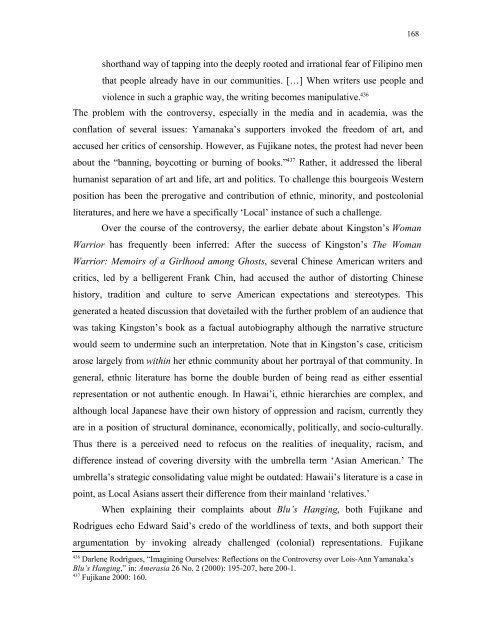A Paradise Lost - KOPS - Universität Konstanz
A Paradise Lost - KOPS - Universität Konstanz
A Paradise Lost - KOPS - Universität Konstanz
You also want an ePaper? Increase the reach of your titles
YUMPU automatically turns print PDFs into web optimized ePapers that Google loves.
shorthand way of tapping into the deeply rooted and irrational fear of Filipino men<br />
that people already have in our communities. […] When writers use people and<br />
violence in such a graphic way, the writing becomes manipulative. 436<br />
The problem with the controversy, especially in the media and in academia, was the<br />
conflation of several issues: Yamanaka’s supporters invoked the freedom of art, and<br />
accused her critics of censorship. However, as Fujikane notes, the protest had never been<br />
about the “banning, boycotting or burning of books.” 437 Rather, it addressed the liberal<br />
humanist separation of art and life, art and politics. To challenge this bourgeois Western<br />
position has been the prerogative and contribution of ethnic, minority, and postcolonial<br />
literatures, and here we have a specifically ‘Local’ instance of such a challenge.<br />
Over the course of the controversy, the earlier debate about Kingston’s Woman<br />
Warrior has frequently been inferred: After the success of Kingston’s The Woman<br />
Warrior: Memoirs of a Girlhood among Ghosts, several Chinese American writers and<br />
critics, led by a belligerent Frank Chin, had accused the author of distorting Chinese<br />
history, tradition and culture to serve American expectations and stereotypes. This<br />
generated a heated discussion that dovetailed with the further problem of an audience that<br />
was taking Kingston’s book as a factual autobiography although the narrative structure<br />
would seem to undermine such an interpretation. Note that in Kingston’s case, criticism<br />
arose largely from within her ethnic community about her portrayal of that community. In<br />
general, ethnic literature has borne the double burden of being read as either essential<br />
representation or not authentic enough. In Hawai’i, ethnic hierarchies are complex, and<br />
although local Japanese have their own history of oppression and racism, currently they<br />
are in a position of structural dominance, economically, politically, and socio-culturally.<br />
Thus there is a perceived need to refocus on the realities of inequality, racism, and<br />
difference instead of covering diversity with the umbrella term ‘Asian American.’ The<br />
umbrella’s strategic consolidating value might be outdated: Hawaii’s literature is a case in<br />
point, as Local Asians assert their difference from their mainland ‘relatives.’<br />
When explaining their complaints about Blu’s Hanging, both Fujikane and<br />
Rodrigues echo Edward Said’s credo of the worldliness of texts, and both support their<br />
argumentation by invoking already challenged (colonial) representations. Fujikane<br />
436 Darlene Rodrigues, “Imagining Ourselves: Reflections on the Controversy over Lois-Ann Yamanaka’s<br />
Blu’s Hanging,” in: Amerasia 26 No. 2 (2000): 195-207, here 200-1.<br />
437 Fujikane 2000: 160.<br />
168

















